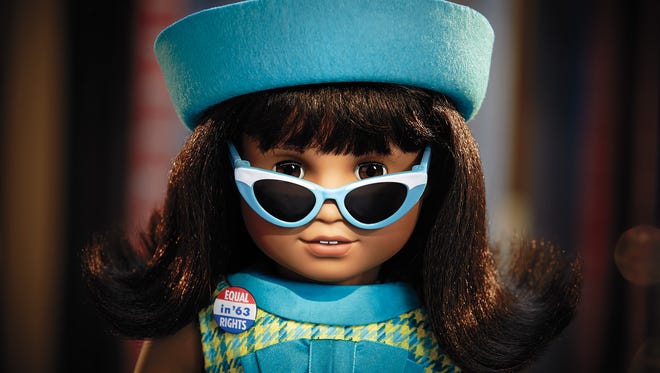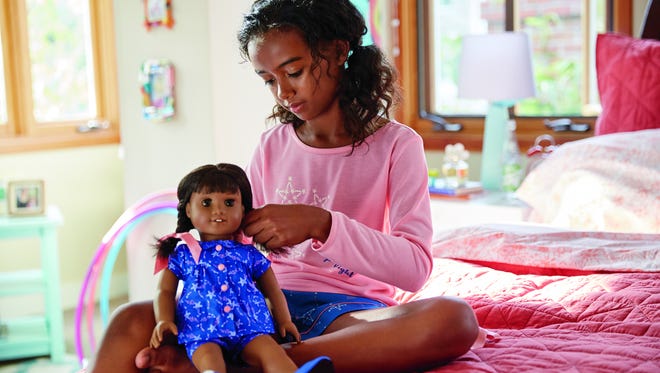Say hello to Detroit's American Girl doll

DETROIT-- She’s got that Motown sound and that Detroit swagger.
Melody Ellison, American Girl’s newest historical BeForever doll, is set to make her debut on Saturday in Detroit. The character is a nine-year-old Detroit girl and aspiring singer who finds her voice amid the civil rights movement in the 1960s, according to the company.
It's fitting that the story American Girl chose to tell to define the mid-1960s is based in Detroit, according to Gloria House, professor emerita of African-American studies at the University of Michigan-Dearborn, who was active during the civil rights movement.
"Why not have her be a little Detroit girl?" she said. "Detroit was so much the mecca of civil rights and movement activities during that period from the '60s right until the '80s."
House notes that Dr. Martin Luther King Jr. did a trial run of his 'I Have a Dream' speech in Detroit in 1963 and that many families with southern roots migrated to Detroit.
"There were so many reasons why it worked to have the family based in Detroit," House said. "There could be so much commentary about the civil rights movement and sort of rooting a story here, and being able to talk about what was going on in the South, the cultural and familial roots of the South and how they played out in the urban North."
At the time, Detroit also had one of the nation's largest NAACP branches and it had the most black-owned businesses in the country along with a growing black middle class.
Yet, said Juanita Moore, president and CEO of the Wright Museum, "there were still these significant issues around race and discrimination, even in Detroit, with all of that progressiveness that was happening here."
Moore said the story of Melody and her family shows that discrimination weren't just a problem in the south during the 60s, but also an issue int he North.

Through historical fiction, the books "really show what democracy is all about — that one voice and one person can work for change and to make things better," Moore said.
"The truth about the civil rights movement is that all of those individuals, they were not rich, they were not powerful, but they created change that changed the way every single person in this country lives today, and impacted human rights movements worldwide," Moore said. "Just to think about that young girl Melody, although a fictional character, it says any one of us can do that, even a young girl."
To ensure local children will be able to read Melody's story and learn the lessons in her books, American Girl donated $100,000 in books — its two paperback volumes, No Ordinary Sound and Never Stop Singing — to Detroit's 22 public library branches, said Julie Parks, a company spokeswoman. Any child who visits the library can get a free copy of either book until the end of the year. Branches also will stock copies of the books to loan out to patrons with a library card.

Several of those dolls will be given away Saturday at the kickoff event at the main Detroit Public Library branch at 3666 Grand River. More will be awarded to winners of the library's summer reading program, and still more will be given away during Noel Night festivities, said Jo Anne Mondowney, executive director of the library.
Mondowney said the author of the books, Denise Lewis Patrick, will appear at the main library and will talking about how she wrote the books.
Parks said American Girl was concerned about the historical accuracy of Melody and her story. So the company consulted with an advisory board that had a rich knowledge of Detroit's history and the history of the civil rights movement. The board included Moore, House, the late civil rights leader Julian Bond and JoAnn Watson, the former Detroit city councilwoman who also served as executive director of the Detroit Branch NAACP, Parks said.
Together, they helped determine how Melody should look, deciding details about her clothing, accessories and even the texture of her hair.
"In the late '60s, the majority of African Americans did have straight hair," said Moore. "It may not have been bone straight, but it was straightened. In addition to our own recollections growing up as '60s girls, there also was historical research."
Moore said they changed the texture of the doll's hair several times to ensure it reflected how her hair might actually have looked.

Moore noted that Melody could have had ponytails or braids, but many "little girls want to play with their doll's hair."
"I can't wait to see a little girl playing with this doll, and I can't wait to see them connect and interact with her story," Moore said. "It's a story that really will resonate so well with young girls."
Melody joins 15 other historical American Girl dolls the company has issued in the last 30 years. The doll, which sells for $115, comes with a hound's-tooth tri-colored dress, matching headband, patent blue shoes, white socks and underwear, along with a paperback book.

Melody's story has resonance even today, and is told in a way that helps young girls understand what the vicil rights movement is about, according to House.
"There is a very lively movement of young African Americans and their allies who come from various races and cultures, Black Lives Matter and other movements on the scene now that in many ways, they pick up from where the movement and organizations of the '60s and '70s left off," House said.
Melody will be introduced to the community at kick-off events at the Detroit Public Library and the Charles H. Wright Museum of African American History on Saturday.
Orders by catalog, online and at other stores nationally won't be available until Aug. 25.
Follow @kristenshamus on Twitter.